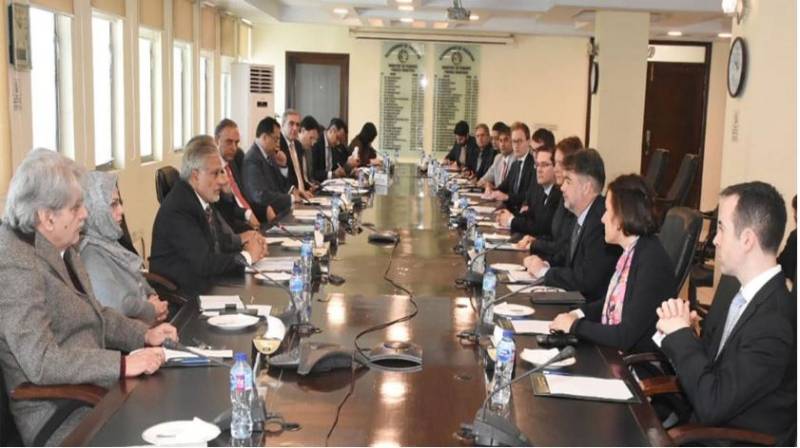Govt assures IMF it will meet Fund’s requirements
Ishaq Dar holds meeting with Fund delegation, says Pakistan committed to work with IMF to complete 9th review: Says reforms being introduced in power and gas sectors: IMF mission head says Fund and Pakistan will work together on fiscal reforms

Stay tuned with 24 News HD Android App

Finance Minister Ishaq Dar has assured the International Monetary Fund that Pakistan is committed to work with it for reaching an agreement to complete the ninth review under the Extended Fund Facility, reported 24NewsHD TV channel.
The review mission of International Monetary Fund (IMF) led by its Chief Nathan Porter called on Finance Minister Ishaq Dar in Islamabad on Tuesday.
The meeting discussed and reviewed the economic and fiscal policies and reforms agenda to accomplish the 9th review under the Extended Fund Facility.
The finance minister briefed the mission on the fiscal and economic reforms and measures being taken by the government in different sectors including bridging the fiscal gap, exchange rate stability and in energy sector for the betterment of the economy.
He said reforms are being introduced in power sector and a high level committee has been formed for devising modalities to offset the menace of circular debt in gas sector.
Expressing the government's resolve to complete the current IMF programme, Ishaq Dar said Pakistan is committed to work with IMF for reaching an agreement to complete the 9th review under Extended Fund Facility.
On the occasion, the IMF mission chief expressed the confidence that Pakistan would meet the IMF requirements for the completion of 9th review.
He hoped that Pakistan would continue towards its progress on reforms in various sectors and will complete the IMF Programme effectively and in time.
He added that the IMF and Pakistan will be working together on fiscal reforms.
The IMF mission is in Pakistan to deliberate on policies aimed at restoring domestic and external sustainability, strengthening fiscal position and power sector reforms.
The talks between Pakistan and the IMF on technical issues will continue till February 2, 2023.
According to AFP, Pakistan is gripped by a major economic crisis, with the rupee plummeting, inflation soaring and energy in short supply as IMF officials visit to discuss a vital cash injection.
Prime Minister Shehbaz Sharif for months held out against the tax rises and subsidy slashing demanded by the International Monetary Fund, fearful of backlash ahead of elections due in October. But in recent days, with the prospect of national bankruptcy looming and no friendly countries willing to offer less painful bailouts, Islamabad has started to bow to pressure.
The government loosened controls on the rupee to rein in a rampant black market in US dollars, a step that caused the currency to plunge to a record low. Artificially cheap petrol prices have also been hiked.
"We're at the end of the road. The government has to make the political case to the public for meeting these (IMF) demands," former World Bank economist Abid Hasan told AFP. "If they don't, the country will certainly default and we'll end up like Sri Lanka, which will be even worse."
Sri Lanka defaulted on its debt last year and endured months of food and fuel shortages that sparked protests, ultimately forcing the country's leader to flee overseas and resign.
In Pakistan, time is of the essence, with Nasir Iqbal from the Pakistan Institute of Development Economics warning the economy had already "virtually collapsed" due to mismanagement and political turmoil.
- Cost-of-living crisis -
The IMF delegation arrived to a nation in panic, still reeling from unprecedented floods that submerged a third of its territory. The world's fifth-biggest population has less than $3.7 billion in the State Bank -- enough to cover just three weeks of imports.
It is no longer issuing letters of credit, except for essential food and medicines, causing a backlog of thousands of shipping containers at Karachi port stuffed with stock the country can no longer afford.
Industry has been hammered by the imports block and massive rupee devaluation. Public construction projects have halted, textiles factories have partially shut down and domestic investment has slowed.
In downtown Karachi, dozens of day labourers including carpenters and painters wait with their tools on display for work that never comes.
"The number of beggars has increased and the number of labourers has decreased," said 55-year-old mason Zafar Iqbal, who was eating biriyani from a plastic bag donated by a passerby. "Inflation is so high that one cannot earn enough."
At the petrol pump, a widow with her son said every few hundred rupees of fuel for their motorcycle was precious, with the pair only eating two meals a day.
"The cost is so high that we eat our breakfast late and the second meal at around seven, with nothing in between," said Ulfat, who declined to give her second name.
Reporter Waqas Azeem
